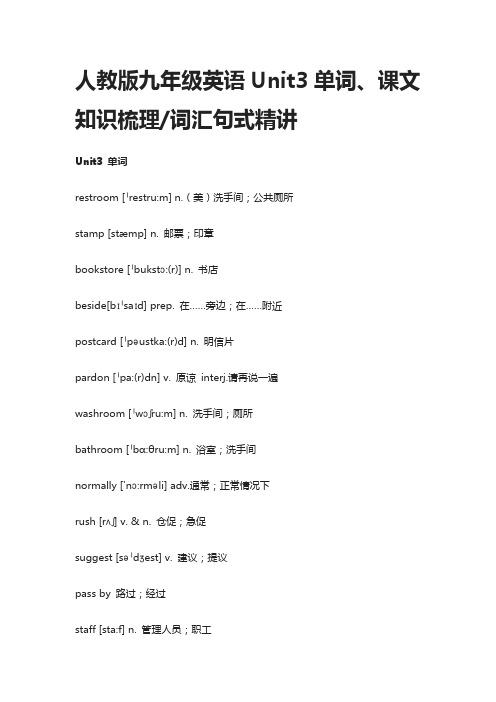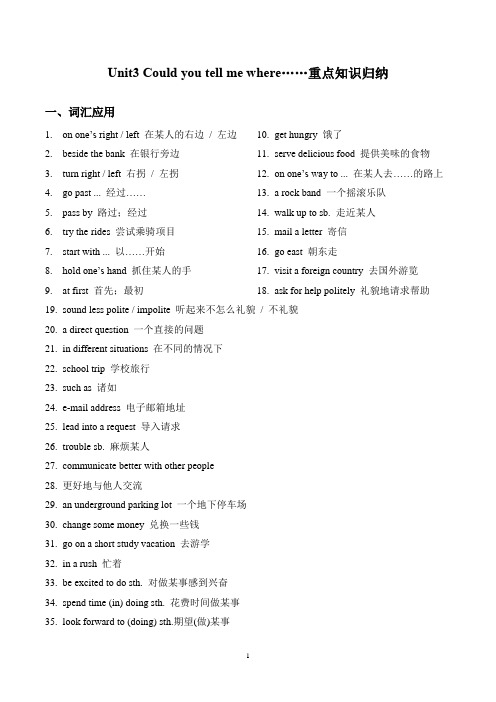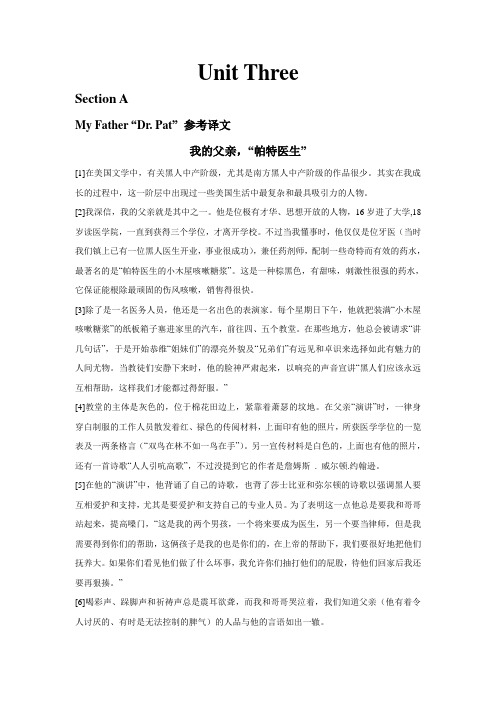Unit 3
unit3-课文精讲

His famous stories
The Adventures of Tom Sawyer; The Adventures of Huckleberry Finn.
Mark Twain: (1835—1910)
The greatest humorist of the 19th
century American literature.
Real name of MT Meaning of his pen name Birth date
Samuel Langhorne Clemens river
1835 (died 1910)
Birth place
Florida
Place where he grew up
In Hannibal, Missoouri, along the Mississippi River.
亨 利:是的,从旧金山来。
罗德里克:你对伦敦熟悉吗?
HENRY: That's right, from San Francisco.
亨 利:一点儿也不熟,这是我第一次
来伦敦。
RODERICK: How well do you know London?
HENRY: Not at all, it's my first trip here.
RODERICK: Young man, would you step inside a moment, please?
HENRY: Who? Me, sir?
RODERICK: Yes, you.
OLIVER: Through the front door on your left.
HENRY: (A servant opens a door) Thanks.
Unit3词汇及翻译

Unit 31.There are aways people who dream to make a(n) from gambling(赌博),even though they know the chances are slim(苗条的、微小的).总有一些人梦想着从赌博中发财,即使他们知道机会很渺茫。
young because he couldn’t work out easy mathematical(数学的) calculations(计算)在发明家托马斯·爱迪生小的时候,被视为是一个傻孩子,因为他连简单的数学运算都算不出来。
犯罪嫌疑人) for about two days before they finally caught him in a deserted warehouse(仓库).警察追赶抢劫嫌疑犯大约两天之后,他们终于在一个废弃的仓库里抓到了他。
运动、活动) to raise money for the girl who has caught a rare(rare) disease(疾病).地方报社开展了一个为患有稀有疾病的女孩捐款活动。
5.Rock climbing is attractive(有吸引力的) especially to young peoplebecause it is always with hardship(困难) and adventure.攀岩是具有吸引力的,尤其是对年轻人来说,因为它总是伴随着困难和冒险。
6.The face value(面值) of the bill(账单、钞票(内在的) value is nothing but that of a piece of paper.该票据面值为一美元,但其内在价值只是一张纸。
7.Having won several championships in international matches recently,hecurrently(目前among the world’s professional tennis players.在最近的国际比赛中赢得了几次冠军,他目前在世界上职业网球选手中排名第二。
Unit 3 知识点详解

1.I’m going to exercise.我将要去锻炼。
exercise锻炼,动词;锻炼,名词exercise=take exercise=take some exercise锻炼2.Are you going to climb a hill?你将要去爬山吗?climb爬,及物动词climb a hill爬山3.You need to exercise and keep fit.你需要去锻炼和保持健康。
need需要,及物动词need to do sth需要去做某事need to exercise需要去锻炼keep保持,系动词fit健康的,形容词keep fit保持健康=keep healthy=stay healthy4.This hill isn’t as high as a real one!这座山没有真的山那么高!high高的,形容词as high as和...一样高(as...as中间加形容词的原形)not as high as不如,没有...高real真正的,形容词a real hill一座真正的山5.Let’s enjoy ourselves!让我们好好享受吧!let’s=let us让我们let让,及物动词let sb do sth让某人做某事Let us play together.让我们一起玩。
enjoy喜欢,享受,及物动词enjoy oneself好好享受,玩得开心enjoy yourself你自己玩得开心enjoy ourselves我们自己玩得开心6.Yesterday I took a boat trip under the famous Harbour Bridge and went past the Sydney Opera House.昨天我在著名的港湾大桥下乘船旅行,经过了悉尼歌剧院。
trip短途旅行,可数名词take a boat trip乘船旅行under在...的下面under the famous Harbour Bridge在港湾大桥下面go past经过=passthe Sydney Opera House悉尼歌剧院go past the Sydney Opera House=pass the Sydney Opera House经过悉尼歌剧院7.I’m having a great time in Australia!我在澳大利亚玩得很开心!have a great time=have a good time=have a nice time=have a wonderful time玩得很开心8.Take care!保重!care照顾,关怀,名词take care保重take care of...照顾...=look after...take good care of...照顾好=look after...welltake good care of yourself=look after yourself well照顾好你自己9.We’re sitting in a little coffee shop by the River Seine.我们正坐在塞纳河旁边的一个小咖啡馆里面。
人教版九年级英语Unit3单词、课文知识梳理,词汇句式精讲

人教版九年级英语Unit3单词、课文知识梳理/词汇句式精讲Unit3 单词restroom [ˈrestru:m] n.(美)洗手间;公共厕所stamp [stæmp] n. 邮票;印章bookstore [ˈbukstɔ:(r)] n. 书店beside[bɪˈsaɪd] prep. 在……旁边;在……附近postcard [ˈpəustka:(r)d] n. 明信片pardon [ˈpa:(r)dn] v. 原谅interj.请再说一遍washroom [ˈwɔʃru:m] n. 洗手间;厕所bathroom [ˈbɑ:θru:m] n. 浴室;洗手间normally ['nɔ:rməli] adv.通常;正常情况下rush [rʌʃ] v. & n. 仓促;急促suggest [səˈdʒest] v. 建议;提议pass by 路过;经过staff [sta:f] n. 管理人员;职工grape [greip] n. 葡萄central [ˈsentrəl] adj. 中心的;中央的Nearby [ˌnɪrˈbaɪ] adj.附近的;邻近的adv.在附近;附近Pardon me 抱歉, 对不起;什么,请再说一遍mail [meil] v. 邮寄;发电子邮件n. 邮件east [i:st] adj. 东方的;东部的adv.向东;n.东方fascinating [ˈfæsineitiŋ] adj.迷人的;有吸引力的. Inexpensive[ˌɪnɪkˈspensɪv] adj.不昂贵的Uncrowded [ʌnˈkraʊdɪd] adj.不拥挤的;人少的convenient [kənˈvi:niənt] adj. 便利的;方便的mall [mɔ:l] n. 商场;购物中心clerk [kla:k][kl:rk] n. 职员corner [ˈkɔ:(r)nə(r)] n. 拐角;角落politely [pəˈlaitli] adv. 礼貌地;客气地request [riˈkwest] n. 要求;请求direction [diˈrekʃn] [daiˈrekʃn] n. 方向;方位correct [kəˈrekt] adj. 正确的;恰当的polite [pəˈlait] adj. 有礼貌的;客气的. direct [diˈrekt, daiˈrekt] adj. 直接的;直率的. speaker [ˈspi:kə] n.讲(某种语言)的人;发言者whom [hu:m] pron. 谁;什么人impolite [ˌɪmpəˈlaɪt] adj. 不礼貌的;粗鲁的address [əˈdres], [ˈædres] n.住址;地址;通讯处. Underground [ˈʌndəɡraʊnd] adj.地下的;n.地铁Parking lot n.停车场course [kɔ:(r)s] n. 课程;学科Italian [Iˈtæli ən] adj.意大利\人的;n.意大利人\语Tim [tim] 蒂姆(男名)Unit3 知识梳理【重点短语】1.a pair of 一对,一双,一副2.between A and B 在a和b之间3.on one’s / the way to 在去……的路上4.pardon me 什么,请再说一遍5.pass by 路过经过6.look forward to 盼望期待7.excuse me 打扰了请原谅8.get some information about 获取有关……的一些信息9.turn left\right 向左\向右转10.go past 经过路过11.a little earlier 早一点儿12.a good place to eat 一个吃饭的好地方13.in different situation 在不同的情况下14.on time 准时按时15.get to 到达16.have dinner 吃晚餐17.on one’s / \the right在右边e on 快点请过来19.the shopping center 购物中心20.the corner of....... 的角落/拐角处21.lead into 导入,引入【重点句型】1.问路常用的句子:①Do you know where is …?②Can you tell me how can I get to …?③Could you tell me how to get to …?④Could/Will/Would you please tell me sth.表示十分客气地询问事情Could you tell me how to get to the park?请你告诉我怎么才能去邮局好吗?2. decide to do 决定做…...She decided to go to have lunch. 她决定去吃午餐。
人教版高中英语必修三unit3知识点汇总及练习

人教版高中英语必修三unit3知识点汇总及练习Ⅱ. 词性变化Ⅲ.重点词汇1. bet n. 赌;打赌v. 打赌;赌钱[典例]1). He often bets a 1ot of money on horses. 他经常在赛马上豪赌。
2). I bet that it will rain tomorrow. 我敢肯定说明天一定会下雨。
[重点用法]bet on为某事打赌make a bet on 为某事打赌win/lose a bet 打赌赢/输了[练习] 按要求翻译。
1).We ______ ______ ______ ______ (打赌)the outcome of the next horse race.2).他把所有的钱都用在赌马上。
_____________________________________________________________________ 2. fault n. 缺点;错误,过错;故障vt.挑剔,指责faulty adj.有缺点的;不完善的faultless adj.不可挑剔的[典例]1). I like him despite his faults. 虽然他有种种缺点, 但我仍然喜欢他。
2). No one could fault his performance. 他的演出无懈可击。
[重点用法]find fault (with sb/sth) 找(某人/事物的)错/茬儿;埋怨(某人/事物)It’ s one’ s fault 是某人的过错[练习] 按要求翻译或填空。
1). It was _______ _______ (他的过错) that we were late.2). I have no fault to find _______ (介词) your work.3). 她总是找我的茬儿。
_____________________________________________________________________ 3. spot vt. 发现;认出n. 污点;斑点;地点spotless adj. 没有斑点的,干净的[典例]1). She spotted her friend in the crowd. 她在人群中认出了她的朋友。
unit 3答案

Unit3 SportsLead-in Activities1.sword playing; chuiwan; wresting; cuju.2.3.Omitted.Text AText Comprehension1.Answer the following questions after you have read the whole text.(1)Because Chinese Martial Arts has a long history, widespread influence and prominent cultural, sports, historic significance.(2)In the later primitive societies the skills of kicking, boxing and blocking began to appear at ceremonial rituals where they were combined with dance to represent their heroes, thus forming the earliest series of Kung Fu moves and performances.(3)Kung Fu styles are often classified according to their common traits and geographical location, identified as “families” “sects” or “schools” of martial arts.They can also be categorized according to religion, imitative-styles and family styles, etc.(4)The former emphasizes muscular strength while the latter the “internal power”, which includes the manipulation of the inner breath and internal circulation.(5)Aside from its function in offence & defence, Kung Fu has a considerable role to play in moral cultivation, body building, and aesthetic appreciation.(6)The Chinese character “武”(martial art) comprises of two characters: “止” (stop) and “戈” (an ancient weapon), which indicates that the essence of martial art is not to fight, but to maintain peace.(7)Chinese Kung Fu was first introduced abroad to the United States by Chinese-American Kung Fu master Bruce Lee, whose agile movements in a series of his great movies swept American audiences off their feet.(8)No. To further delight audiences, movie makers add more and more modern techniques into their films exaggerating the effect of Kung Fu.Vocabulary Exercises1.Choose appropriate words to fill in the gaps below. Change the form if necessary.(1)enchant (2) Primitive (3) render (4) prominent (5) imitative (6) exaggerated (7) deficient (8) circulation (9) survival (10) embraces2.Translate the following sentences into English with the words given below. Note that you are encouraged to use the sentences in Text A.(1)Chinese Kung Fu is effective both in battle and in building physical strength. In addition, it unites with the traditional medicine concepts of human’s meridians and collaterals, Qi and blood.(2)During thousands of years (of development),Kung Fu has developed into a comprehensive system embracing numerous sects, schools and disciplines rare seen in the world.(3)All schools of Chinese Kung Fu masters hold it a top priority to cultivate moral characters, spirit and temperament, as well as develop good manners and conduct, through practicing martial arts.(4)Different with the aggressive and brutal western boxing based on the value of individualism, Chinese martial art is imbued with Chinese people’s unique perspective on fighting, profound culture and philosophy including Confucianism, Daoism and Buddhism, thus forming a comprehensive and unique system.(5)Coming up to date, Chinese Kung Fu has become something of a necessity in movies and soap operas.Text BText Comprehensionplete the following paragraph according to the above text.The United Kingdom is notable for the diversity of its sporting interest. Sports play an important role in promoting integration and in nurturing talents in the country. The country has given birth to several major international sports such as football, rugby, cricket, golf, tennis, and track and field among others. Sport is a major source of entertainment in the UK with thousands of spectators filling stadiums and arenas to cheer on their favorite teams. Sports are also major sources of revenue in the UK for players, government, and investors.Cricket was first embedded in the UK before spreading to the rest of the Commonwealth C. The comparative slowness and quietness reflects British gentlemanly sportsmanship. Also, cricket is often believed to be associated with a set of English sportsmanship values such as “fair play”, “team spirit”and individual excellence. If any action in other spheres of life, whether in business, politics or everyday interaction does not meet these standards, particularly of honesty and fairness, it is described as “not cricket”.2.Read the text and Mark T for true statements, and F for false statements below.1.F2. T3. F4. T5. F6. T7. T8. T9.T 10. FTheme-related Exercises1.Read the following passage and fill in the gaps with words given in the box.Cricket fighting (斗蟋蟀)is a kind of sport involving the fighting of male crickets in China. Unlike most blood sports such as bullfighting and cockfighting, cricket fighting rarely causes injuries to the animals. To play the game, two crickets are matched up according to size, weight, and color. Both combatants are placed in a small fighting arena, with walls high and thick enough to prevent desertion. The cricket trainers stimulate their charges with a straw or a fine-haired brush, and then the insect warriors go at each other, antennae waving and jaws snapping.Cricket Culture in China encompasses a history of 2000 years. The two millennium of tradition may be divided into three eras. From times prior to the Tang dynasty (500 B.C. - 618 A.D.), people only appreciated the cricket’s powerful tunes. During the Tang dynasty (618 - 907A.D.), the imperial concubines used small gold cages to accommodate crickets and took them to bed to hear their singing during the night. In the Song dynasty (960 - 1279 A.D.), cricket fighting flourished as a popular sport. Such an activity was still flourishing during the Qing Dynasty (1616-1911), when the Emperor’s family, city residents or village men and scholars, all collected crickets feverishly every summer. The tradition has ancient roots and has been handed down throughout the generations to the present day.For centuries, China has regarded a cricket chirping around the house as an auspicious symbol, a deluge of cricket means wealth will come to the family. Now, cricket fighting is mainly found in the large cities of Shanghai, Beijing, Tianjin, Guangzhou, and Hong Kong. There are cricket fighting clubs and societies that cater to member’s interest at all levels of intensity. With the migration of Chinese to otherparts of the world, cricket fighting can be found in New York and Philadelphia.2.Translate the following paragraph into English with the words in the brackets.Traditional sports with distinct Chinese characteristics are very popular, including martial arts, taijiquan, qigong, Chinese chess and Go (or encirclement chess). Martial arts, combining exercise and self-defense, enjoy great popularity in China. Martial arts include bare-handed boxing as well as offence and defense with equipment, both of which has different schools. Taijiquan, or Chinese shadow boxing, is one of the internal styles of Chinese martial arts. It combines control of body, mind and breath. Qigong, a system of deep breathing exercises, is a unique Chinese way of keeping fit. It aims at enhancing health, promoting longevity, curing illnesses and improving physiological functions by concentrating the mind and regulating the breath.。
人教版九年级英语Unit3重点知识归纳

Unit3 Could you tell me where……重点知识归纳一、词汇应用1.on one’s right / left在某人的右边/ 左边2.beside the bank 在银行旁边3.turn right / left 右拐/ 左拐4.go past ... 经过……5.pass by 路过;经过6.try the rides 尝试乘骑项目7.start with ... 以……开始8.hold one’s hand 抓住某人的手9.at first 首先;最初10.get hungry 饿了11.serve delicious food 提供美味的食物12.on one’s way to ... 在某人去……的路上13.a rock band 一个摇滚乐队14.walk up to sb. 走近某人15.mail a letter 寄信16.go east 朝东走17.visit a foreign country 去国外游览18.ask for help politely 礼貌地请求帮助19.sound less polite / impolite 听起来不怎么礼貌/ 不礼貌20.a direct question 一个直接的问题21.in different situations 在不同的情况下22.school trip 学校旅行23.such as 诸如24.e-mail address 电子邮箱地址25.lead into a request 导入请求26.trouble sb. 麻烦某人municate better with other people28.更好地与他人交流29.an underground parking lot 一个地下停车场30.change some money 兑换一些钱31.go on a short study vacation 去游学32.in a rush 忙着33.be excited to do sth. 对做某事感到兴奋34.spend time (in) doing sth. 花费时间做某事35.look forward to (doing) sth.期望(做)某事e on 加油;快点儿37.pardon me 抱歉,对不起;什么,请再说一遍二、重点句型1.问路常用的句子:①Do you know where is … ?①Can you tell me how can I get to …?①Could you tell me how to get to …?①Could/Will/Would you please tell me sth.表示十分客气地询问事情Could you tell me how to get to the park?请你告诉我怎么才能去邮局好吗?2. decide to do 决定做…...She decided to go to have lunch. 她决定去吃午餐。
Unit 3 参考译文及答案

Unit ThreeSection AMy Father “Dr. Pat”参考译文我的父亲,“帕特医生”[1]在美国文学中,有关黑人中产阶级,尤其是南方黑人中产阶级的作品很少。
其实在我成长的过程中,这一阶层中出现过一些美国生活中最复杂和最具吸引力的人物。
[2]我深信,我的父亲就是其中之一。
他是位极有才华、思想开放的人物,16岁进了大学,18岁读医学院,一直到获得三个学位,才离开学校。
不过当我懂事时,他仅仅是位牙医(当时我们镇上已有一位黑人医生开业,事业很成功),兼任药剂师,配制一些奇特而有效的药水,最著名的是“帕特医生的小木屋咳嗽糖浆”。
这是一种棕黑色,有甜味,刺激性很强的药水,它保证能根除最顽固的伤风咳嗽,销售得很快。
[3]除了是一名医务人员,他还是一名出色的表演家。
每个星期日下午,他就把装满“小木屋咳嗽糖浆”的纸板箱子塞进家里的汽车,前往四、五个教堂。
在那些地方,他总会被请求“讲几句话”,于是开始恭维“姐妹们”的漂亮外貌及“兄弟们”有远见和卓识来选择如此有魅力的人间尤物。
当教徒们安静下来时,他的脸神严肃起来,以响亮的声音宣讲“黑人们应该永远互相帮助,这样我们才能都过得舒服。
”[4]教堂的主体是灰色的,位于棉花田边上,紧靠着萧瑟的坟地。
在父亲“演讲”时,一律身穿白制服的工作人员散发着红、禄色的传阅材料,上面印有他的照片,所获医学学位的一览表及一两条格言(“双鸟在林不如一鸟在手”)。
另一宣传材料是白色的,上面也有他的照片,还有一首诗歌“人人引吭高歌”,不过没提到它的作者是詹姆斯. 威尔顿.约翰逊。
[5]在他的“演讲”中,他背诵了自己的诗歌,也背了莎士比亚和弥尔顿的诗歌以强调黑人要互相爱护和支持,尤其是要爱护和支持自己的专业人员。
为了表明这一点他总是要我和哥哥站起来,提高嗓门,“这是我的两个男孩,一个将来要成为医生,另一个要当律师,但是我需要得到你们的帮助,这俩孩子是我的也是你们的,在上帝的帮助下,我们要很好地把他们抚养大。
- 1、下载文档前请自行甄别文档内容的完整性,平台不提供额外的编辑、内容补充、找答案等附加服务。
- 2、"仅部分预览"的文档,不可在线预览部分如存在完整性等问题,可反馈申请退款(可完整预览的文档不适用该条件!)。
- 3、如文档侵犯您的权益,请联系客服反馈,我们会尽快为您处理(人工客服工作时间:9:00-18:30)。
Consolidation
1.Do WB EX ( P . 20 )
Ask the students to look at the pictures and complete the sentences .
2. Homework
Feedback
学生基本掌握如何用英语表达打电话。部分学生还不掌握规则动词的过去式,要加强练习。
4.Make sentences in the past tense using the verb strips , e.g. First I finished my homework . Then I …Next I … After that ,I … Take down each strip as you mention it and write in the sentence using a different colour to highlight the ed on the end of the verb . Ask the students to say the sentences after me .
The Third Period
Step 1
Dairy talk
Step 2
Revision
Teaching Part B2
1.(Book open ) Ask the students What did Koko do on Saturday? Write the question on the hoard and show the students the past tense of the auxiliary did . Ask the question again and tell the students to answer . Check that they are using the correct form of –ed on the verbs .
5.Play the tape and point to the speech bubbles . Ask the students to repeat after the casstte .
Step 3
Practice
1.(Books open) , Tell the stedents to look at the picture and ask What’s te weather like ? Have the class amswer It’s raining . Ask some students what they can do on a rainy day . Then ask the students to repeat the words in the conversation .
3.Check that the students have ticked the right-hand side picture . Play the tape again and ask the students to repeat the conversation .
4.Have the students role-play Pat and Tim in pairs .
2.Display the verb strips on the board . Teach the meanings of the words on the verb strips by miming or showing the actions .
3.Mime the actions again and ask What am I doing ? The class answers You are …ing …
5.Rub out the past tense of the verbs leaving just the time cinnectives , First ,Then , Next , After that . Tell the students there is no one correct order for these words . They can be used in any order ,except that first is always the first .
6.Then give the verb strips to a student . Ask him/ her to come out to the front to attach them to the board in any order . Ask the class to make the past tense sentences using the connectives . Listen carefully that they are pronouncing the ed sound . Note that this sound changes according to the preceding sounds , e.g. in played ,listnende and cleaned it sounds like /d/ , in surfed , finished and watched it sounds like /t/ .
Unit 3 .A rainy weekend
Contents
1.New words
2.Sentence Patterns
Teaching aim
1.The pupils can talk about the activities on a rainy day they can do .
2.The children can describe the activities on a rainy day .
2.Ask the students to take turns to make sentences about what Candy and Pat can do .
3.Ask the students to work in pairs . Tell them that on Saturday they are going spend the day together . Redisplay the sentence strips . Ask them to suggest to each other what they can do and to choose one of the actions on the board , e.g. We can surf the Internet . Good idea . I want to play a game . Check with the pairs what they want to do by asking What do you want to do on Saturday ?
Step 4
Consolidation
1.Do the WB EX ( P 17 )
Tell the students to read the word in the box and look at the pictures , Then ask the students to complete the sentences by choosing the correct words from the boxStp 4Practice
1.(Book open )Show Pat and Tim at the top of the page .Explain that Pat and Tim are at their own homes . They are talking to each other on the telephone . Tell the students When the phone rings in Tim’s home , Tim’s father answers the phone . This step has been added to teach the students the correct phrases to use on the telephone . You could ask the students to practice asking to speak to each other and pretending to be one’s own patent in pairs .
Main points
ing simple past tenses of regular verbs .
2.Asking Wh-questions .
ing adverbs of sequence .
Difficult point
The pupils can use the simple past tenses of regular verbs .
2.Tell the students Before you listen , look at the two pictures at the bottom of the page . Only one is correct . Listen to what Tim did this morning before Pat called him on the telephone . Tick the correct picture .
4.Play a miming game . Take down the verb strips . Divide the class into two teams . Ask a member of one team to come out . Have them read a sentence strip silently then mime the action . Ask his or her team What is he /she going ? If the team can answer correctly they get one point .If they answer wrongly . the other team can guess . Ask a member of the other team to come out next .
